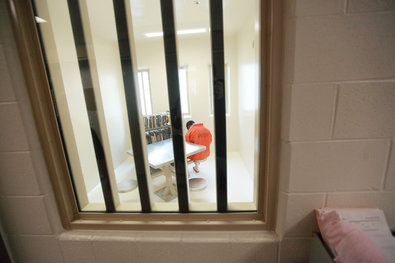
Getting the Mentally Ill Out of Jail and Off the Streets
The federal government has accused South Dakota of unconstitutionally warehousing the mentally ill and disabled in nursing homes. Meanwhile, at least 16 percent of the nation’s jail and prison inmates are estimated to be mentally ill and about 40 percent of the mentally ill have been incarcerated. Many of the homeless are also mentally ill. Deinstitutionalization, which began decades ago, was supposed to improve treatment, but was not followed by funding for better care. Do we need to return to mental hospitals and other forms of institutional commitment to treat those with severe mental illness? Or are there other, more effective means of treatment?
* the mentally ill = 정신 질환자들/ accuse A of B = A를 B라는 이유로 비난하다/ unconstitutionally = 위헌적으로/ warehouse = (열약한 환경의) 보호 시설로 보내다/ prison inmate = 수감자/ incarcerate = 감금[투옥]하다/ deinstitutionalization = 탈시설화(脫施設化)/ commitment = (돈, 시간, 인력의) 투입/ means of ~ = ~의 수단
 심한 정신 질환을 갖고 있는 사람들을 치료하기 위해 정신 병원과 다른 형태의 기관적 투자가 필요한가요?
심한 정신 질환을 갖고 있는 사람들을 치료하기 위해 정신 병원과 다른 형태의 기관적 투자가 필요한가요?
1. Psychiatric Institutions Are a Necessity
High quality, ethically administered psychiatric asylums would provide the seriously mentally ill with a place to stabilize and recover.
2. Addiction Cannot Be Ignored
Mental illness goes hand-in-hand with drug use, either because substance use exacerbates symptoms or because drugs are used to self-medicate.
3. The Mentally Ill Need Supportive Affordable Housing
A small number of individuals with serious mental illnesses need long-term hospital care, but no one should need this level of care forever.
4. Keep Them From Getting Behind Bars
The police must be able to recognize the symptoms of mental health crises, and need facilities other than jails to which they can take people in such crises.
Sample Essay
How to Keep the Mentally Ill From Getting Behind Bars
Jails and prisons have become de facto mental health facilities: prisoners have rates of mental illness two to four times greater than for the general public. Yet prisons and jails are the worst possible place for people with serious mental health problems.
Because of understaffing, limited programs and correctional cultures of discipline and punishment, men and women behind bars with mental health conditions are often untreated or under-treated, and have scant help coping with unbearably stressful environments.
When they fail to follow the rules or are disruptive, officers often respond by placing them in solitary confinement – a toxic environment for most people, but especially those prone to psychosis or depression. Staff use of force is also all too common: Many prisoners with mental illness have been beaten until their bones are broken and organs are injured, deluged with chemical sprays, shocked with electric stun devices, and strapped to chairs and beds for days.
This violence only aggravates their conditions and makes future treatment more difficult. In the worst cases, staff force kills them.
Reforms are needed inside jails and prisons. But the single most important way to keep people with mental illness safe from unnecessary or abusive force behind bars is to keep them out of the criminal justice system entirely.
Their first brush with the law starts with the police, who are often on the front line of dealing with people in a psychiatric crisis that may involve unlawful behavior. Many police are not trained in how to recognize the symptoms of mental health crises, and respond inappropriately. Some cities, like Portland, Ore., have reportedly made great strides in training their officers in de-escalation techniques for responding in such crises without force. But such training is not yet widespread. A recent Police Executive Research Forum survey found that the average young officer receives only eight hours of de-escalation training, compared to 58 hours of firearms training and 49 hours of defensive tactical training.
But even the best trained police need more facilities other than jails to which they can take people experiencing such crises. Communities need robust networks of mental health services — networks that are all too lacking today. The also need more mental health hospital beds. An untold number of men and women sit in jails today waiting for vacancies in those hospitals where they can get the level of care they need.
Wholly apart from mental health care, fewer people with mental illness would end up behind bars if we stopped criminalizing minor symptoms of mental illness, as well as homelessness, poverty and substance abuse. It would also help to have more tolerance for bizarre or discomfiting, but harmless, public behavior.
A societal shift toward compassion and respect for the human rights of people we may not understand is long over-due.





![]() 심한 정신 질환을 갖고 있는 사람들을 치료하기 위해 정신 병원과 다른 형태의 기관적 투자가 필요한가요?
심한 정신 질환을 갖고 있는 사람들을 치료하기 위해 정신 병원과 다른 형태의 기관적 투자가 필요한가요?






